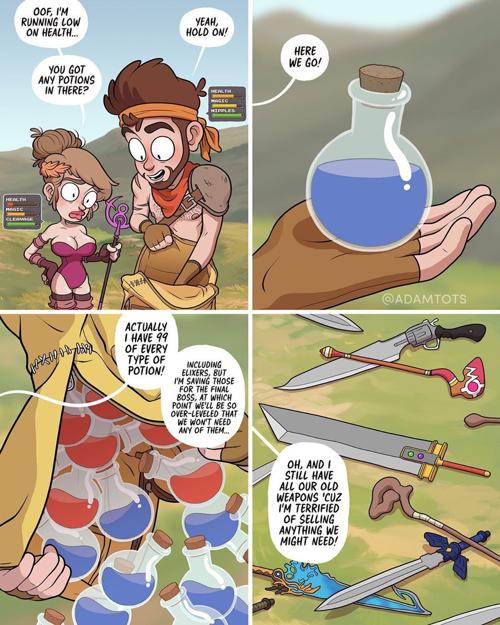Watching Allie play Dragon Age: Inquisition again. As I mentioned before she’s not particularly interested in combat-related systems - and this is an action RPG, so a lot of systems are combat-related. She’s been getting more confident and adventurous over time (she literally said, “I’ve sort of figured out how to fight at least,” as I was writing this) but she still avoids micromanagement. She auto-assigns skill points, but since this isn’t an option for equipment she mostly just loots everything and doesn’t worry about sorting things out until she has to.
Unfortunately, the game has an inventory limit, so that’s what determines when she has to deal with managing her gear: it’s when she’s picked up an arbitrary number of items and hit that limit. And in fact, the first time this happened and she was prevented from looting more, she was in the middle of an action-packed quest. No merchants around, no reason to expect she could return and loot later, and an actual ticking time limit while she considered her options.
Naturally, this damaged the pacing of the quest and added uninteresting stress. She trashed a few items from her inventory, looted back up her to limit, and then just stopped looting for the rest of the quest.
In a later session, she was working on side quests and one directed her vaguely to explore a particular area in the hills. Her inventory filled up while she was there, so she stopped looting equipment. Unbeknownst to her, the way to complete the quest was to loot a specific piece of equipment from a specific crate - and though she’d looted the crate, she’d left this equipment behind and there was no indication that it was the target of her quest. After several minutes, we finally had to look it up. She destroyed something in her inventory, looted the item, and completed the quest.
Yet later, she beat a tough boss far into a long quest and started to walk away from the corpse without looting it. I try not to pressure her on how to play, but I couldn’t help myself from pointing out that (as she surely already knew) a tough boss probably dropped good loot. She showed me that due to items forced into her inventory for the quest which she was unable to get rid of, she was already seven items over the inventory limit and would have to destroy at least eight to pick anything up.
This stuff keeps happening and it is always dumb. The common problem is that the game expects the player to be periodically managing their equipment and inventory - and if they don’t do so, they are suddenly punished for it when the arbitrary limit is reached. The player has been avoiding this system because they aren’t interested in it, and now it gets shoved in their face - generally in a particularly obnoxious way. It happens in circumstances where the lack of inventory space directly affects the player’s ability to take advantage of opportunities or achieve objectives, away from merchants who could turn the excess gear into money instead of just trashing it.
